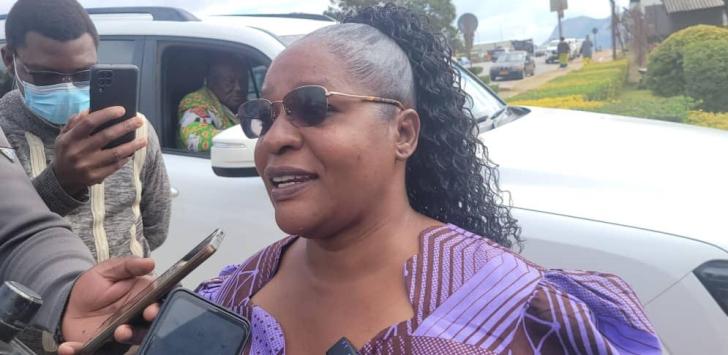News / National
New Zanu-PF boss tackles factionalism
03 Aug 2025 at 14:11hrs |
0 Views

Newly-elected Zanu-PF Manicaland Women's League chairperson Dorothy Mabika has launched a province-wide unity campaign aimed at healing deep-seated divisions following her narrow and controversial rise to the post.
Mabika, who was backed by Zanu-PF Women's League secretary Marble Chinomona, narrowly edged out Mercy Sacco in a tense vote overseen by national political commissar Munyaradzi Machacha. She clinched the position with 23 votes to Sacco's 16. Sacco enjoyed the backing of senior party figure Patrick Chinamasa.
The leadership race, held in the wake of the suspension of former chairperson Happiness Nyakuedzwa, exposed rifts within the party's provincial structures, pitting factions aligned with Chinomona and Chinamasa against each other. Before Mabika's controversial co-option, Sacco had been serving as the acting chairlady.
In the aftermath of the election, Mabika has hit the ground running - embarking on a reconciliation and consolidation tour across Manicaland, a region that has long been a political battleground within the ruling party.
"Manicaland is vast, and I'm meeting some members for the first time," Mabika told reporters during one of her stops. "Our focus is unity - the foundation of development. We're also mobilising grassroots support for Vision 2030 and women's empowerment projects."
However, observers remain sceptical about Mabika's ability to unify a fractured Women's League. The contest between her and Sacco featured parallel meetings and open clashes between their camps, underscoring entrenched factional loyalties within Zanu-PF.
"This wasn't just a provincial power struggle," said political analyst Raymond Chikasha. "It mirrored national-level factionalism, with implications for the broader succession debate inside Zanu-PF."
Indeed, the fallout has already prompted accusations and counter-accusations between Chinamasa and Chinomona. In a letter dated June 6, Chinamasa challenged Mabika's co-option, describing it as irregular. Chinomona, in turn, accused Chinamasa of meddling in Women's League matters - adding fuel to an already volatile intra-party feud.
Party insiders say the tensions in Manicaland reflect longstanding rivalries within Zanu-PF, often reignited by debates around succession. President Emmerson Mnangagwa, whose term constitutionally ends in 2028, has publicly stated he does not seek an extension, setting the stage for a high-stakes elective congress in 2027.
"Manicaland has often served as a bellwether for internal power shifts," added Chikasha. "If Mabika can assert control and truly unify the province, she could become a key player in the succession matrix."
For now, Mabika's reconciliation push continues - but whether her charm offensive can survive the headwinds of Zanu-PF's complex factional politics remains to be seen.
Mabika, who was backed by Zanu-PF Women's League secretary Marble Chinomona, narrowly edged out Mercy Sacco in a tense vote overseen by national political commissar Munyaradzi Machacha. She clinched the position with 23 votes to Sacco's 16. Sacco enjoyed the backing of senior party figure Patrick Chinamasa.
The leadership race, held in the wake of the suspension of former chairperson Happiness Nyakuedzwa, exposed rifts within the party's provincial structures, pitting factions aligned with Chinomona and Chinamasa against each other. Before Mabika's controversial co-option, Sacco had been serving as the acting chairlady.
In the aftermath of the election, Mabika has hit the ground running - embarking on a reconciliation and consolidation tour across Manicaland, a region that has long been a political battleground within the ruling party.
"Manicaland is vast, and I'm meeting some members for the first time," Mabika told reporters during one of her stops. "Our focus is unity - the foundation of development. We're also mobilising grassroots support for Vision 2030 and women's empowerment projects."
"This wasn't just a provincial power struggle," said political analyst Raymond Chikasha. "It mirrored national-level factionalism, with implications for the broader succession debate inside Zanu-PF."
Indeed, the fallout has already prompted accusations and counter-accusations between Chinamasa and Chinomona. In a letter dated June 6, Chinamasa challenged Mabika's co-option, describing it as irregular. Chinomona, in turn, accused Chinamasa of meddling in Women's League matters - adding fuel to an already volatile intra-party feud.
Party insiders say the tensions in Manicaland reflect longstanding rivalries within Zanu-PF, often reignited by debates around succession. President Emmerson Mnangagwa, whose term constitutionally ends in 2028, has publicly stated he does not seek an extension, setting the stage for a high-stakes elective congress in 2027.
"Manicaland has often served as a bellwether for internal power shifts," added Chikasha. "If Mabika can assert control and truly unify the province, she could become a key player in the succession matrix."
For now, Mabika's reconciliation push continues - but whether her charm offensive can survive the headwinds of Zanu-PF's complex factional politics remains to be seen.
Source - the standard
Join the discussion
Loading comments…

































